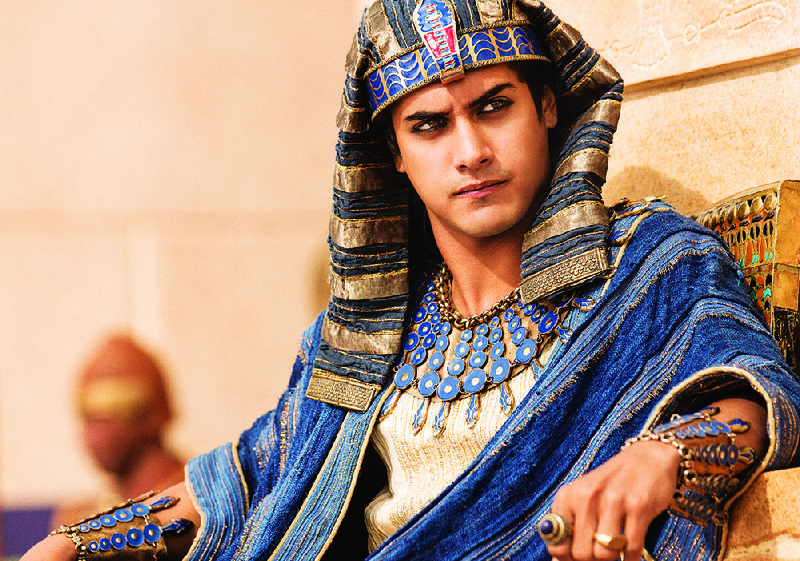Let's just get the song out of the way up front:
(King Tut ...)
(King Tut ...)
Now when he was a young man,
He never thought he'd see
(King Tut...)
People stand in line to see the boy king.
(King Tut ...)
That old Steve Martin novelty classic (watch the video on YouTube) has been stuck in my head ever since the press kit for Spike TV's "most ambitious dramatic scripted project in network history" arrived.
Tut, a three-night, six-hour "event" series premieres at 8 p.m. today and continues Monday and Tuesday. Event? Let's just say Spike TV spent a pile of money on this project and it shows.
Martin's 1978 song pays homage to Egyptian pharaoh Tutankhamun and the "Treasures of Tutankhamun" traveling exhibit that wowed America from 1976 to 1979. Millions stood in line to see it.
In fact, Tut has fascinated the world since the discovery of his nearly intact tomb in the Valley of the Kings in 1922. His famous burial mask has become the icon of ancient Egypt.
But what do we really know about "the boy king?"
Tutankhamun lived a short life during the 18th Egyptian dynasty known as the New Kingdom, in 14th century B.C. Much of Tut's life is shrouded in mystery and legend, but it is known that his father was the former pharaoh Akhenaten, and his mother ("The Younger Lady") was probably his father's sister.
Tut ascended to the throne around the age of 9, at which time he married his half-sister, Ankhesenamun. Tut and his wife did not produce an heir.
As a young boy, Tut reigned with the help of powerful advisers, including General Horemheb and Grand Vizier (prime minister) Ay, Tut's great-uncle and successor. Much of Tut's reign was dedicated to repairing the damage done by his father, whose attempted religious reforms had left Egypt in disarray. Tut reinstated the old religion and restored many of the temples dedicated to the god Amun.
Tut was around 19 when he died. Assassination? Infection from his broken left leg? Malaria and Kohler disease II? Any number of other maladies and infirmities?
Spike TV deals with his death in its with dramatic license. Here's the network overview.
"Tut is a tale of Tutankhamun's rise to power and his struggle to lead Egypt to glory while his closest advisers, friends and lovers scheme for their own nefarious interests.
"Thrust at a tender age into power after the murder of his father, Tut is forced to marry his strong willed, ambitious sister in order to maintain the dynasty.
"In love with a commoner, Tut struggles to protect her from the jealous queen. And although Tut rules as pharaoh, he is exploited by a shrewd grand vizier, a ruthless military general and a scheming high priest who look down on him as someone they can control.
"But through unexpected twists and turns, Tut strives to overcome the odds, rising from a manipulated prince into an unlikely hero who triumphs over his enemies leading his kingdom to glory."
Oh, it's an event, alright. It's an old-fashioned, rip-snorting, sword and sandals, testosterone-fueled, three-night adventure.
Tut is a sweeping soap opera costume drama told on a grand stage. It stars Oscar winner Ben Kingsley (Gandhi) as the grand vizier Ay; Nonso Anozie (The Bible) as the ambitious General Horemheb; Sibylla Deen (Tyrant) as Tut's sister/wife Ankhe; and Alexander Siddig (Game of Thrones) as the duplicitous high priest Amun.
Peter Gadiot (Once Upon a Time in Wonderland) plays Tut's best friend Ka. His secret: He's in love with Ankhe. It gets awkward.
A strapping 23-year-old Avan Jogia, formerly of the Nickelodeon series Victorious, portrays the boy king without any of the infirmities that must have plagued the real Tut.
In tonight's episode, Tut gets to show his inner action hero by manning up and handling the threat of the invading Mitanni, a state that encompassed present day Syria, eastern Turkey and northern Iraq.
In bloody and graphic fighting, the Egyptians win the day, but Tut is badly wounded and left on the field to die. He is rescued by a beautiful half-Mitanni village girl and, well, I don't want to give it all away.
In an interview with Spike TV, writer and executive producer Michael Vickerman said he was intrigued by the possibility of Tut because no one had done it.
"We're telling the journey of Tut from boy to man, his growth as a human being and his desire to do good for his people.
"The story is Tut's personal journey of figuring out who he is, how is he going to be remembered, and, whether history will look at him the way it did his father, who was despised, or as his grandfather, who was revered."
Finally, be sure to admire the elaborate sets created in Morocco, especially Tut's "condo made of stone-uh."
Style on 07/19/2015
